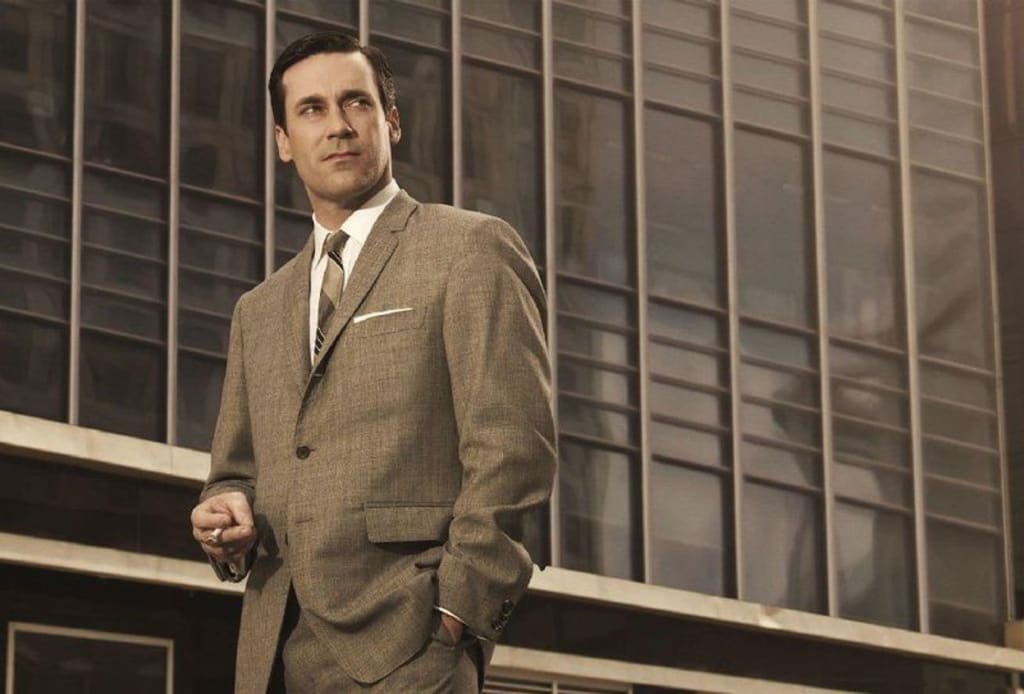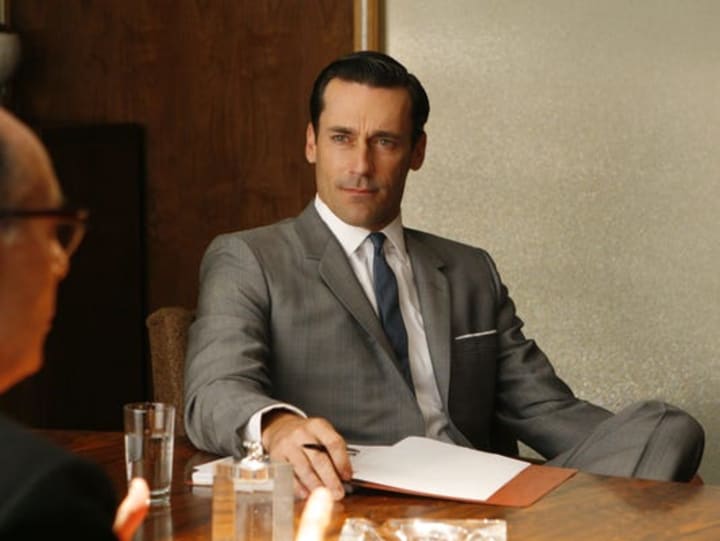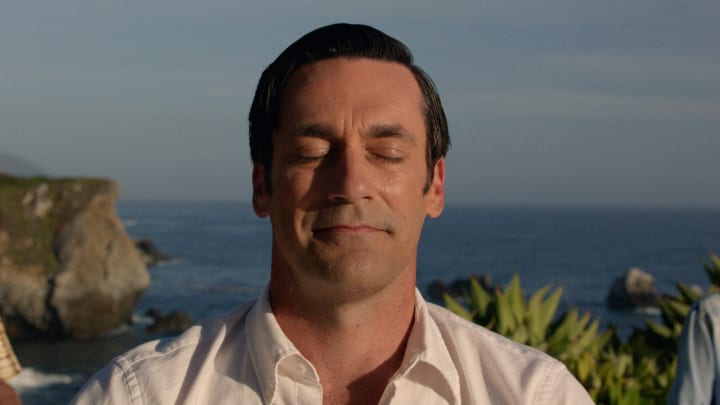The Don Draper Success Plan
What Does This Fascinating Character Teach Us About Achieving More?

Don Draper of Mad Men is one of the most memorable characters to fill television screens in a long time.
He's been the subject of plenty of essays about American masculinity and the culture of the 1960s. Mad Men has even inspired a college course.
The Don Draper character is full of contradictions.
On the one hand, he exudes confidence, presence, and charisma.
He is also extremely flawed and selfish. A man who mistreats women, and manipulates others for his own personal gain.
And he struggles with some serious issues. He drinks and smokes too much. He disappears at the worst possible times. He lashes out when things don't go his way.
And yet, none of these bad traits derail his career, because of a few masterful moves he's perfected.
Who Is Don Draper?

Mad Men's Final Season Came Closest To Exposing Don's Weaknesses, "I wanted him to commit to change," says Matthew Weiner, Mad Men's creator.
Don Draper, the creative and competitive ad man, is a myth. He grew up in rough circumstances, the son of a penniless whore who gave him the name Dick Whitman. However, after the war, he assumed the persona of "Don Draper" in order to give himself a chance at achieving a better life.
Over time, the line between what was real, and what was put-on was blurred to the point that even the man himself couldn't tell where Dick Whitman stopped and Don Draper began.
You could argue that assuming a new identity was just his way of giving himself permission to be the man he always dreamed he could be—bold, seductive, and in demand.
Perception makes reality.
While a name can easily be changed, creativity, intelligence, and instincts are harder to fake. They had to have been a part of his nature in some form from the start.
Being Don Draper gave him the confidence to pursue his dreams.
What Makes Don So Good At His Job? It Starts With The Way He Moves.

Don Draper works in a creative field in an incredibly competitive market–yet he almost always comes out on top. Is it just make-believe? Maybe not.
The keys to his success may lie in a few real-life traits that anyone (male or female) could learn to cultivate into their unfair advantage.
First, Don Draper's body language serves him in every situation.
Don always positions himself in a place of power in any room he's in. It doesn't matter if he's alone with a lover, or in a conference room full of bosses.
Additionally, once he's in a position where all eyes are on him, he relaxes–spreads out, makes himself long and angular. He waits for his opportunity to strike, and never looks frazzled or rushed.
If a person wants to speak to Don, they have to lean towards him. In some cases, Don even leans back further, making the other person work extra hard for his attention and eye contact.
He does all of this very subtly, making sure others are never aware of his display of dominance.
In some of the scenes where one of Don's ad pitches doesn't go as well as he'd hoped, he shows he's not afraid to let people walk out on him—even if losing their sale means a great loss for his company, and even him personally.
This ability to not panic in the face of a crisis, makes other people wonder what he knows that they don't. Often, he is able to bring the deal back to the table just by acting like he has nothing to lose.
Don Draper Looks Inward For Inspiration, Instead Of Following Trends

In Don's world, if you're not the first to come up with something, you might as well pack up and go home.
For this reason, you don't see him spending much time spying on the competition, or trying to steal from other's ideas.
Don trusts his instincts, which are formed from his world view. He filters everything he’s exposed to with his own unique lens.
The ideas that are capable of cutting through the noise, and really making an impact on others almost always have a touch of the personal. Think of the movies and albums you love most.
Don's ideas seem exciting and new, because they couldn't have come from anyone else.
Emerson, in his essay Self Reliance says, “to believe in your own heart, that what is true for you is true for all men—that is genius.”
This is also what gives his clients and coworkers so much faith in him. They're buying what's inside his head, not a template or gimmicky strategy.
Don Draper Never Allows Himself To Feel Like He's Arrived

For a man who seemingly has it all despite his bad behavior, Don never allows himself to feel like he's made it. In fact, a lot of his motivation is fueled by shame.
While this burden has its negatives (the alcoholism and trouble maintaining relationships) it also keeps Don on the cutting edge—always pushing himself to come up with bigger and better ideas, and never settling for the cliché or easy choice.
Ego can become a roadblock in anyone's career. It can be especially damaging to the creative process when left unchecked. A good artist has to remain capable of calling out their own bullshit.
Don Draper has tremendous confidence in his own ability, but he balances it out with quiet moments of introspection—never forgetting how fortunate he is to be where he is, considering how he got there.
In other words, while everyone else is drinking the "Don is a genius" kool-aid, Don's occasionally bringing himself back down to earth with the bourbon of regret.
This dual nature allows him to be a commanding presence in the boardroom, but also humble enough to consider other ideas.
Essentially, much of Don's success comes from his restless nature of never being fully satisfied with what he's done before.
There's Probably A Little "Don" In All Of Us

In The End, Don Has A Breakthrough, Both Personally And Professionally, By Accepting What He Can't Change And Realizing He Is Not Alone.
Don Draper is not a hero or an antihero. He is a character who feels like a real person—neither all good or all bad. While he understands that he can't go back and undo the mistakes he's made that hurt the innocent, he also learns to accept the fact that he can change his course at any time.
He reinvented himself once, what's to stop him from becoming Don 2.0—retaining the perception and creativity that give his life purpose, while learning to control the self-destructive patterns that make him dangerous to get close to?
This is a lesson to all of us. Our ability to evolve should never be underestimated. And it’s never too late to pursue a new direction.
Sometimes, the crutches that we think are fueling our success, are actually holding us back from even bigger and better things.
About the Creator
Brendan Blowers
Brendan is a former writer for Haute Living and current contributing editor to atHome magazine. He also manages communications for a Southeast-leading architecture and design firm.






Comments
There are no comments for this story
Be the first to respond and start the conversation.